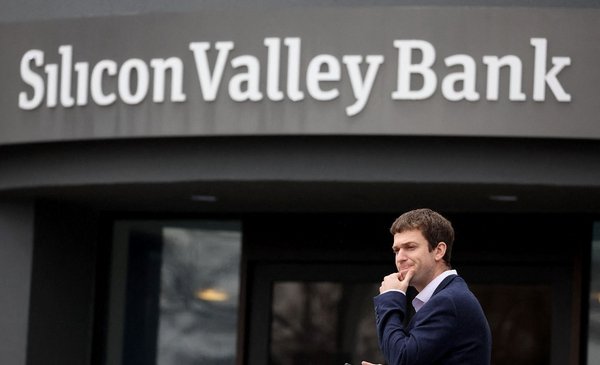US bank Silicon Valley Bankwhich worries the entire financial sector lAfter announcing that it urgently seeks liquidity, it is under pressure and the listing of its shares was suspended this Friday on the New York Stock Exchange.
The United States authorities closed the bank to protect the deposits of its clients and will reopen the institution on Monday under federal control, official sources reported, amid fears of contagion of the problems of that financial entity to the rest of the banking sector.
The California Department of Financial Protection and Innovation (DFPI) closed SVB and named the Federal Deposit Insurance Corporation (FDIC) as the depository of the bank’s funds, the federal agency reported.
In the short term, clients will be able to withdraw up to US$250,000. Clients with the most money in the bank – the vast majority – were invited to contact the FDIC.
The SVB is the first institution with deposits guaranteed by the federal corporation to fail since 2020, according to the FDIC.
What is BLS?
Silicon Valley Bank (SVB) is a Californian bank specializing in the technology sector, which does business primarily with funds that invest in unlisted companies.
Little known to the public, it is the 16th largest US bank by the size of its assets.
The group, which operates in the United States, Europe, Asia and Israel, offers financial services to start-ups, among others, from simple bank accounts to advice to capitalize.
SVB indicates on its website that it works with about 50% of technology companies.
AFP
What was the troubled bank looking for?
The bank’s parent, SVB Financial Group, announced Wednesday that it would try to raise $2.25 billion in fresh funds.
The group quickly sold a portfolio of US$ 21,000 million of financial titles, with an estimated loss of 1,800 million.
SVB seeks to strengthen its finances, weakened by customer withdrawals.
According to The Wall Street Journal, citing sources close to the banking sector, investment funds advised companies to withdraw their money from SVB and, in reaction, the bank’s CEO on Thursday urged his clients “not to withdraw their deposits and not sow fear or panic”.
But on Friday morning, the listing of SVB shares was suspended on the New York Stock Exchange pending a communication from the company, after a 60% drop in its titles on Thursday and a decline of more than 60 % again in pre-open electronic exchanges.
According to CNBC, the bank was unable to obtain the necessary capital and is negotiating its sale to another bank.
Why is SVB in trouble?
Closely linked to technology companies, the SVB suffers from the deterioration of the sector: the sharp rise in interest rates in the United States that affects a sector that is highly dependent on financing for growthAdded to semiconductor sourcing difficulties and weak investor appetite for tech stocks, mark the end of the post-pandemic tech euphoria.
The market capitalization of technology companies collapsed in 2022, and announcements of mass layoffs among Silicon Valley firms have multiplied for months.
The rise in interest rates resolved by the Federal Reserve (Fed, central bank), also affects banking institutions.
Banks take money in the short term to grant loans in the medium and long term, a model that hurts their prospects in a context of high rates.
Why do technology suffer?
The problems of a single bank can affect the confidence of investors in the sector around the world.
Banks are interdependent, as the financial crisis of 2008-2009 and the bankruptcy of Lehman Brothers bank showed.
The specter of a bank run, a chain reaction that begins with massive customer withdrawals until banks are unable to respond, always looms over the sector.
To meet the demand for cash, the bank has no choice but to raise money or cede assets quickly, which often entails expenses or losses, and exacerbates its difficulties.
For analyst Christian Parisot, “the question now is to know which other banks could come under pressure because their net interest margins have contracted,” he said in a note to broker Aurel BGC.
Parisot estimates that “the risk is limited to small banks” and a limited number of US regional banks.
The US Treasury Secretary, Janet Yellen, said this Friday that she is closely following the situation of the Californian bank.
“There are recent developments involving a few banks that I am monitoring very carefully,” Yellen told a congressional committee. “When banks have financial losses it is and should be a matter of concern,” she concluded.
Source: With information from AFP


















